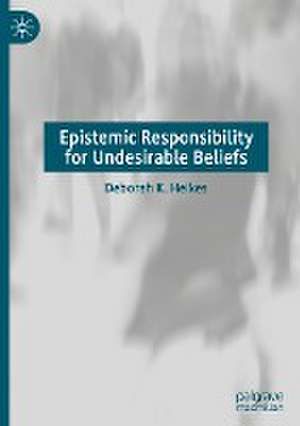Epistemic Responsibility for Undesirable Beliefs
Autor Deborah K. Heikesen Limba Engleză Hardback – 22 sep 2023
This book explores each of these topics with the aim of establishing the nature of undesirable beliefs and our responsibility for these beliefs with the understanding that there may well be (rare) occasions when undesirable beliefs are not epistemically culpable.
Preț: 697.65 lei
Preț vechi: 820.76 lei
-15% Nou
Puncte Express: 1046
Preț estimativ în valută:
133.49€ • 140.12$ • 110.80£
133.49€ • 140.12$ • 110.80£
Carte tipărită la comandă
Livrare economică 11-25 aprilie
Preluare comenzi: 021 569.72.76
Specificații
ISBN-13: 9783031418570
ISBN-10: 3031418573
Ilustrații: VIII, 233 p.
Dimensiuni: 148 x 210 mm
Greutate: 0.44 kg
Ediția:1st ed. 2023
Editura: Springer Nature Switzerland
Colecția Palgrave Macmillan
Locul publicării:Cham, Switzerland
ISBN-10: 3031418573
Ilustrații: VIII, 233 p.
Dimensiuni: 148 x 210 mm
Greutate: 0.44 kg
Ediția:1st ed. 2023
Editura: Springer Nature Switzerland
Colecția Palgrave Macmillan
Locul publicării:Cham, Switzerland
Cuprins
1. Epistemic Responsibility: An Overview.- 2. What Is Undesirable Belief?.- 3. Can There Be Epistemic Responsibility?.- 4. What About the Exculpatory Effects of Ignorance?.- 5. It’s Not My Fault.
Notă biografică
Deborah K. Heikes is Professor of Philosophy at the University of Alabama in Huntsville.
Textul de pe ultima copertă
This book considers whether we can be epistemically responsible for undesirable beliefs, such as racist and sexist ones. The problem with holding people responsible for their undesirable beliefs is: first, what constitutes an “undesirable belief” will differ among various epistemic communities; second, it is not clear what responsibility we have for beliefs simpliciter; and third, inherent in discussions of socially constructed ignorance (like white ignorance) is the idea that society is structured in such a way that white people are made deliberately unaware of their ignorance, which suggests their racial beliefs are not epistemically blameworthy.
This book explores each of these topics with the aim of establishing the nature of undesirable beliefs and our responsibility for these beliefs with the understanding that there may well be (rare) occasions when undesirable beliefs are not epistemically culpable.
DeborahK. Heikes is Professor of Philosophy at the University of Alabama in Huntsville.
Caracteristici
Considers how racist and sexist beliefs can be held to be genuinely undesirable in a world of post-truth and alt-facts Addresses epistemic involuntarism and whether individuals are responsible for their racist and sexist beliefs Examines the nature of epistemic responsibility for social epistemologists who treat ignorance as socially constructed
